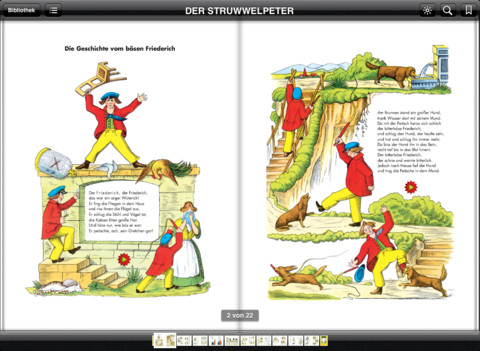 |
| "Struwwelpeter" describes a boy who does not groom himself properly and is consequently unpopular. |
For some reason I woke up this morning thinking of the German bedtime stories my parents read us when we were kids. Along with "The House at Pooh Corner," we were periodically read tales from Dr. Heinrich Hoffman's "Der Struwwelpeter," a work of literature I'm certain has long since been banned by concerned parents groups in every corner of the globe. The book contains graphically-illustrated stories about children who misbehave and the horrible consequences they reap in doing so. Like the bratty kid who is mean to others, including his own dog, who retaliates by attacking the boy; the child who won't eat anything on his plate and eventually dies of starvation; and the little girl who plays with matches, catches herself on fire — and burns to death. The protagonist Struwwelpeter (pictured on the book's cover) appears a gruesome looking beast — a result of his refusal to attend to the rituals of his own grooming. And my personal unfavorite: a thumb-sucking boy is attacked by a scary joker-looking guy who slices the boy's thumb off with a pair of scissors (a thumb-sucker myself, this was especially horrifying!). Most of the naughty children in this book end up dying as a result of their naughtiness. That these nightmarish stories and images are still in my brain is a wonder, as I never read this book to my own children, for obvious reasons.
Yet my German mother and American father thought it important to retell (in English translation) the stories of Struwwelpeter to us when we were kids. My mom's parents read them to her when she was little, and for some reason my dad, God bless him, was also on board. Believe it or not, the collective hours these disturbing tales were read at our bedside are some of the happiest memories of my childhood. I love them so much.
I'm pretty sure my brother and sister would both agree we were not traumatized by their telling — we recognized their absurdity and understood this was pretty far out stuff. In contrast to the horror we viewed on the pages, the rhyming prose was lilting — even soothing. I especially remember the stories read in my father's comforting tenor voice. We totally understood the underlying messages and what our parents were teaching us through each little drama: If you are unkind; if you fail to treat other people and your parents with respect; if you don't take care of yourself; if you are reckless in your actions — there will be consequences. Probably the most important life lessons parents can teach their children.
Perhaps the reason these books are heavy on my mind lately is that my own children are currently approaching their lives as adults. Whatever lessons their father and I taught them when they were young are pretty much set in stone, and to my sheer gratification, both have made excellent choices in their lives to this point in time. The other night I had a "date" with my son at a nice restaurant. He thanked me, not only for the gourmet meal, but also for NOT handing everything to him on a silver platter when he was growing up. He's living on his own and financially supporting himself through college, and although money is always tight, he's quite proud of himself for doing so. My children grew up knowing about boundaries and consequences. Like if you misbehave at a store we are leaving that store, and so on. Every now and then I had to say "that is not acceptable." No need to spank or lecture; they understood. Where did I get this stuff? I'd have to say Struwwelpeter was a large contributor.
I am by no means a perfect parent. I have stumbled and corrected and stumbled again and corrected again too many times to count. But the older I get and the more knowledge I acquire I see more and more human behavior, both locally and globally, I absolutely deplore: Selfishness, greed, dishonesty, laziness, disloyalty, disrespect, spitefulness ... The list goes on and on. Parents make their children the center of the universe and as a result of little or no boundaries they grow up believing they're just that. What can be done about the roots of evil that have plagued societies for centuries and by every indication are likely to exist for centuries to come? You gotta love the Germans, who offered the world a simple answer in the mid-nineteenth century through this book and others like it: Nip them. Nip them in the bud.
 |
| In "Die Geschichte vom Zappel-Philipp" (The Story of the Fidgety Philip), a boy who won't sit still at dinner accidentally knocks all of the food onto the floor, to his parents' great displeasure. |
 |
| In "Die gar traurige Geschichte mit dem Feuerzeug" (The Dreadful Story of the Matches), a girl plays with matches and burns to death. |
 |
| In "Die Geschichte vom Daumenlutscher" (The Story of the Thumb-Sucker), a mother warns her son not to suck his thumbs. However, when she goes out of the house he resumes his thumb sucking, until a roving tailor appears and cuts off his thumbs with giant scissors. |


No comments:
Post a Comment